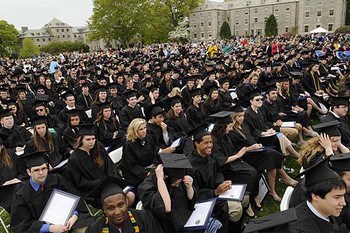Harvard Law Professor Noah Feldman is slated to speak at the 96th Connecticut College Commencement in a little over a month. While I am certainly excited to hear his speech addressing the graduating class of 2014, I do have qualms with the fact that it seems little has been done in bringing a more diverse speaker to commencements past and present. Feldman brings a lot to the table and has an impressive résumé when it comes to publications. That being said, he is another straight, white man who will deliver this speech, following two others speakers (Howard Gordon in 2013 and Louis B. Susman in 2012) who were in a similar social location. In light of this, I wonder if Conn’s commitment to “diversity” permeates every aspect of campus, or whether it is limited to faculty and the student body.
“Diversity” is a huge buzzword on campus these days. Conn is really trying to address issues of race, class, gender, sexuality and the intersection thereof on campus. I have heard talk of incorporating a diversity requirement in the General Education reform, emphasizing inclusive excellence and have attended numerous events and lectures where diversity was the hot-button topic. The College is also one of the leading members of the C3 program, which aims to create more access to higher education for underrepresented, high-achieving students. Regarding diversity on campus, it is evident that Conn has taken the initiative to make important changes.
Personally, I feel the word “diversity” falls flat of the goals that our institution wishes to accomplish. One of my favorite professors, Professor Harris of the Sociology department, suggests that diversity is not a strong enough word when addressing issues of power and privilege in contemporary American society, or the microcosm that exists on our campus. She suggests that these issues be dubbed “power and privilege” because the phrase more accurately reflects systems and structures of power that are in place that limit those who are underrepresented. It goes without saying that Professor Harris has left a lasting impact on me and my sociological lens has been polished thanks to her. Nevertheless, I will use the word “diversity” because I do believe it pertains to this issue, which our commencement speakers these past few years significantly fail to represent.
As someone who was on the commencement speaker committee this past fall, I could not help but see these issues in the way the meetings were run. While I cannot go into too much detail regarding the process or what was said in the meetings, I will say that I believe that those who were involved had the best intentions. Regardless, I understood little of the politics that went on behind these types of decisions, but did recognize that the list of potential names was barely diverse.
One thing that truly struck me was that both student feedback and the interest of potential donors (namely family members attending commencement) were considered; I was under the impression that the commencement speaker was chosen solely based on the former. The College acknowledges that student interest is key, but it also does not want to make potential donors feel uncomfortable by having a more “controversial” speaker. This is not to say that having a “diverse” speaker would be controversial, but rather that there importance was placed on how the speaker would look to outsiders.
I will admit that my invisible class status impacted my perception of what unfolded, and my sociological insight might have driven me a little mad. I am unsure if the marginalization I felt skewed my perception, but the politics of the Commencement Committee left a bad taste in my mouth nonetheless. Regardless of his social location, Noah Feldman will be a wonderful and articulate speaker for the Class of 2014’s commencement. He truly seems to make ethical choices and is aware of his own privilege and position of power, and will no doubt deliver an amazing speech and impart wisdom to the soon-to-be graduates. Moving forward, though, I believe Conn should extend the commitment to diversity by taking steps toward finding a more diverse speaker for future commencement addresses.•










